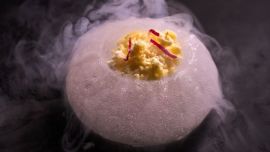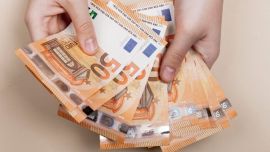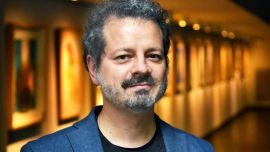Russian President Vladimir Putin announced he’s recognising two self-proclaimed separatist republics in eastern Ukraine, a dramatic escalation in Moscow's stand-off with the West as the United States and its allies continue to warn it could soon invade its neighbour.
Those fears were likely heightened by the detail of the decrees signed by Putin, including an order for the Defence Ministry to send what he called “peacekeeping forces” to the breakaway regions. There were no details so far on how many troops might go in, or when, but Russia has previously accused Ukraine of having a significant deployment of its own soldiers on the line of contact with the separatists.
While Russia will argue that Putin’s recognition of the separatist regions gives a legal basis for the presence of its troops, the move will likely fuel US and European concerns that Moscow is moving to take control of territory internationally recognized as part of Ukraine, and would put his forces closer to direct confrontation with Ukrainian soldiers.
“The question is now whether the US and its partners are ready to pursue dialog uein these new conditions,” said Andrey Kortunov, head of the Kremlin-founded Russian International Affairs Council. “We can say the worst hasn’t happened – a major new war hasn’t started, at least for now – but after the recognition we’re likely to see Russian troops deployed up to the border with the rest of Ukraine and this will be seen as an act of aggression with all the consequences.”
Putin signed aid and cooperation pacts with the separatist leaders at a Kremlin ceremony after a televised address to Russians late Monday. “I consider it necessary to take the long overdue decision to recognise the independence and sovereignty of the Donetsk People’s Republic and the Luhansk People’s Republic,” Putin said.
He followed up with a demand that the government in Kyiv stop all military action immediately or bear full responsibility for “the possible continuation of bloodshed.” Ukraine and the West accuse Russia of instigating violence as part of a so-called “false flag” operation to justify intervention.
European Union states and the United States were quick to condemn Putin’s move and kick off efforts to impose economic penalties. It’s still unclear what his announcement means for the risk of a large-scale Russian invasion of Ukraine that the United States and NATO have warned about for months. They accuse Russia of massing more than 150,000 troops near Ukraine in preparation for a possible attack, something the Kremlin has repeatedly denied. Putin said at a meeting of his Security Council Monday that Russia was not considering the question of annexing the two territories.
The decree is the latest move in Putin’s 20-year campaign to restore Russia’s dominance over its former Soviet neighbours and prevent them forging closer ties with the West, particularly with the North Atlantic Treaty Organisation. The Russian leader has railed against NATO’s expansion into the east and raised the stakes in the latest crisis by demanding the military alliance exclude Ukraine from future membership and roll back its forces to positions they held in 1997.
The Russian president’s decision to recognise the separatists effectively torpedoes years of diplomatic efforts to implement a peace accord to resolve a conflict that has killed 14,000 since Russia-backed separatists seized control of the two areas in 2014. The move also casts further doubt on hopes raised Sunday of a possible US-Russia summit meeting to ease tensions.
News of the decree drew rebukes from across the EU, including smaller states located in the bloc’s far east. The UK is set to impose sanctions on Russia as soon as Tuesday, and the EU will start the process of agreeing penalties for Putin’s move, diplomats familiar with the conversations said.
UK Prime Minister Boris Johnson called Putin’s decision an “ill omen” and “flagrant violation” of the sovereignty and integrity of Ukraine. “I don’t know what is in his mind,” he told a Downing Street press conference. “There’s a chance he could row back from this.”
US President Joe Biden held a phone call with Ukrainian President Volodymyr Zelenskiy shortly after Putin’s announcement, then convened a call with French President Emmanuel Macron and German Chancellor Olaf Scholz, the White House said.
Biden’s administration is “ready to respond immediately” with an Executive Order that will ban new trade, investment and financing of the breakaway regions by US citizens, White House Press Secretary Jen Psaki said in a statement. “These measures are separate from and would be in addition to the swift and severe economic measures we have been preparing in coordination with Allies and partners should Russia further invade Ukraine,” she said. Trade and investment has already plummeted since Russian-backed separatists took control of the regions eight years ago.
'Disappointment'
Hours before he spoke on TV, Putin told Macron and Scholz of his intention to sign the recognition decree in calls Monday. The European leaders “expressed disappointment” but showed willingness to continue contacts, according to a Kremlin statement.
The US and its allies have warned that any intervention in Ukraine would prompt swift and severe economic sanctions against Russia, though it’s not certain how far they may go in response to Putin’s decision to recognise the breakaway regions. They have also made clear they would not send troops into Ukraine themselves if Putin attacked.
In his televised address to Russians late Monday, Putin devoted part of his argument to a historical recitation aimed at showing that Russia’s former Soviet neighbours were created by the Bolsheviks and don’t deserve to be considered as genuine independent states.
Recognition of the territories marks the fourth time that Putin has unilaterally redrawn the borders that emerged from the Soviet Union’s collapse 30 years ago. After Russia’s 2008 war with Georgia, it recognised the breakaway territories of Abkhazia and South Ossetia as independent states. In 2014, Putin annexed Crimea from Ukraine.
The decision on recognition came after Russia’s Security Council on Monday endorsed the move at a special meeting. The Kremlin statement didn’t mention the separatists’ request for military aid along with recognition.
Officials who spoke at the meeting urged Putin to recognise the separatists, with some saying the borders of what Russia would now regard as a sovereign and independent state should extend further to include the whole of Ukraine’s Donetsk and Luhansk provinces – about 70 percent of which remain under the control of the government in Kyiv.
Earlier Monday, state television showed appeals from the separatists’ leaders for recognition, calling on the Kremlin to agree to provide military support, as well. Last week, Russia’s parliament voted overwhelming to ask Putin to recognise the breakaway republics.
Putin had long rejected such calls, which would nullify the 2014-2015 Minsk peace accords and with them the potential for reintegrated but newly autonomous pro-Russia regions to influence policy making in Kyiv. It would also transfer the burden of pension payments and reconstruction costs from Kyiv to Moscow.
Russia has granted passports to more than 800,000 residents of the so-called Donetsk People’s Republic (DNR) and Luhansk People’s Republic (LNR), which it has supported financially and militarily since their formation in 2014.
In recent days the separatist leaders have said they are under assault by Ukrainian forces in what officials in Kyiv and the West have described as a fabricated narrative, begun after Russia put a massive force in place for a potential attack.
On Monday, Russia said it had killed five Ukrainian saboteurs and destroyed two Ukrainian armored personnel carriers that had entered Russian territory. Ukraine dismissed that claim as fake.
Recognition would at this point be just the first step in a longer chain of events, according to Pavel Danilin, a political analyst close to the Kremlin. “The DPR will be able to defend itself for several days. This will be enough to recognise their independence and send troops there,” he said. After that, he added, the two newly minted states would be able to demand that Ukraine withdraw its forces from the rest of Donetsk and Luhansk.
“And if there are attempts to deploy American offensive weapons, then other regions will follow,” Danilin said, with the “dismemberment” of Ukraine on the table.
related news
by Henry Meyer, Marc Champion & Tony Halpi, Bloomberg
























Comments